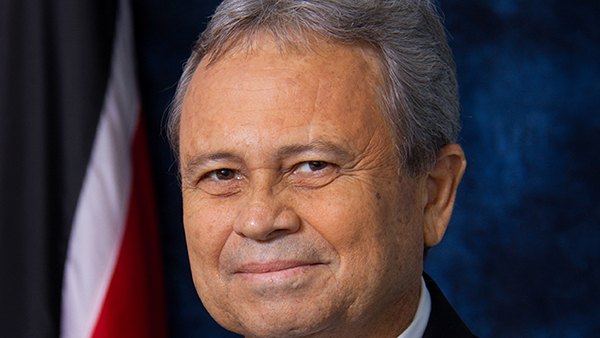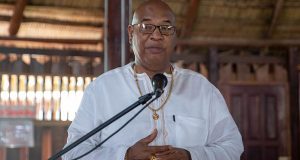Photo above: Trinidad and Tobago Finance Minister, Colm Imbert. Photo credit: T&T Ministry of Finance.
PORT OF SPAIN, Trinidad and Tobago, Mar. 22, (CMC) – The Trinidad and Tobago government says, it will not purchase the multi-billion dollar, debt-ridden, ArcelorMittal Point Lisas, a subsidiary of the world’s leading steel and mining company.
Finance Minister, Colm Imbert, said, that ArcelorMittal, which has been losing money since 2008, is in the process of winding up the company, in accordance with the Companies Act, and the next step would be to advertise that resolution, appoint a liquidator, meet with creditors and dissolve the company.
“If the government were to take on this liability now, we would have to absorb three billion dollars (One TT dollar –US$0.16 cents) in debt.
“It doesn’t appear that it makes sense for the government to purchase the plant at this time, reason being, the huge debt levels and also the absence of a market for the product,” said Imbert, adding, that the company had benefitted from reduced electricity costs.
Imbert, who met with the steel plant workers’ union and with company representatives, said, the workers expressed concern over their severance benefits and pension payments.
But the Finance Minister said, the company was under no legal obligation to pay its workers severance benefits, which would be allowed under laws of Trinidad and Tobago, as the company is seeking to voluntarily wind up its operations rather than retrench its workers.
“Legally, right now, they can avoid the severance benefit liability by dissolving the company, which I assume is why they are doing what they are doing,” Imbert said, adding, that he was told by ArcelorMittal that the steel workers “would have been entitled to” about US$30 million if they had been retrenched, “but the company has not retrenched the workers, they are dissolving the company.”
He said, because ArcelorMittal had started a process of the voluntary winding up of its Point Lisas operations, the law did not mandate the company to settle its severance obligations.
“Unfortunately, with our present law, and as Minister of Finance, I have to look, urgently, at the Companies Act and the insolvency legislation. When a company winds up, as they are doing, there is no requirement for severance benefits to be paid. Obviously, the workers are very worried about this,” Imbert said.
“What would happen is that the assets would just be sold to meet outstanding liabilities and severance benefits would not be one of those liabilities, according to the law,” he added.
He said, the Board of ArcelorMittal Point Lisas had passed a resolution, in accordance with the Companies Act, for voluntary winding up of the company.
The minister said, ArcelorMittal indicated it was looking at ways and means of paying the terminal benefits to the workers from the sale of the plant’s assets, which are worth an estimated US$80 million.
“That is not in writing and it is not a legal obligation on their part,” said Imbert, adding that he “certainly hoped that if it came to this and they are able to realise the amount of money they think they would, that they use the funds to pay their workers”.
He said, the company told him that its indebtedness was now about US$450 million, which is the amount of money that a pre-winding up purchaser would have to assume, compared with about US$80 million for all the plant, equipment and inventory after dissolution.
Imbert said, he was also told that ArcelorMittal Point Lisas was subjected to 25 per cent countervailing duties on its exports to the US, because of the “level of support” it received from Trinidad and Tobago.
 Pride News Canada's Leader In African Canadian & Caribbean News, Views & Lifestyle
Pride News Canada's Leader In African Canadian & Caribbean News, Views & Lifestyle





